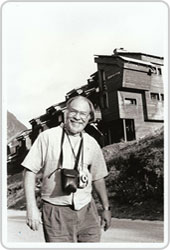 The University of Maryland Department of Physics and Condensed Matter Theory Center host the annual Richard E. Prange Prize and Lectureship in Condensed Matter Theory and Related Areas. The Prange Prize honors Professor Prange, whose distinguished career at Maryland spanned four decades. He died suddenly on September 24, 2008, at age 76.
The University of Maryland Department of Physics and Condensed Matter Theory Center host the annual Richard E. Prange Prize and Lectureship in Condensed Matter Theory and Related Areas. The Prange Prize honors Professor Prange, whose distinguished career at Maryland spanned four decades. He died suddenly on September 24, 2008, at age 76.
The prize was made possible by the generosity of Dr. Prange’s wife, Dr. Madeleine Joullié of the University of Pennsylvania.
Recipients of the Prange Prize:
2023: Pablo Jarillo-Herrero, Massachusetts Institute of Technology
2020: Charles Kane, University of Pennsylvania (lecture postponed until Fall 2021)
2018: Juan Maldacena, Institute for Advanced Study
2016: Frank Wilczek, Massachusetts Institute of Technology
2014: Klaus von Klitzing, Max Planck Institute
2013: David Gross, University of California, Santa Barbara and Kavli Institute for Theoretical Physics
2012: Andre Geim, University of Manchester
2011: Daniel C. Tsui, Princeton University
2010: Walter Kohn, University of California, Santa Barbara and Kavli Institute for Theoretical Physics
2009: Philip Anderson, Princeton University
Dr. Richard Prange did his graduate studies at the University of Chicago, where he worked with recent Nobelist Yoichiro Nambu, among others. He accepted a position at the University of Maryland in 1961.
Until his retirement in 2000, he played a vital role in the life of the Physics department. He led a substantial reform of its undergraduate major program and served energetic and innovative terms as chair of crucial departmental entities, including the Salary, Priorities, and Appointment, Promotion and Tenure committees. His was an important and highly-respected voice in all departmental deliberations.
Dr. Prange was the editor of a well-known book on the Quantum Hall Effect, but his interests reached well beyond condensed matter, into every substantive aspect of theoretical physics, including some pioneering work on quantum chaos. He was at complete ease discussing subjects as disparate as ferromagnetism and the cosmological constant. His interests also included history and travel.